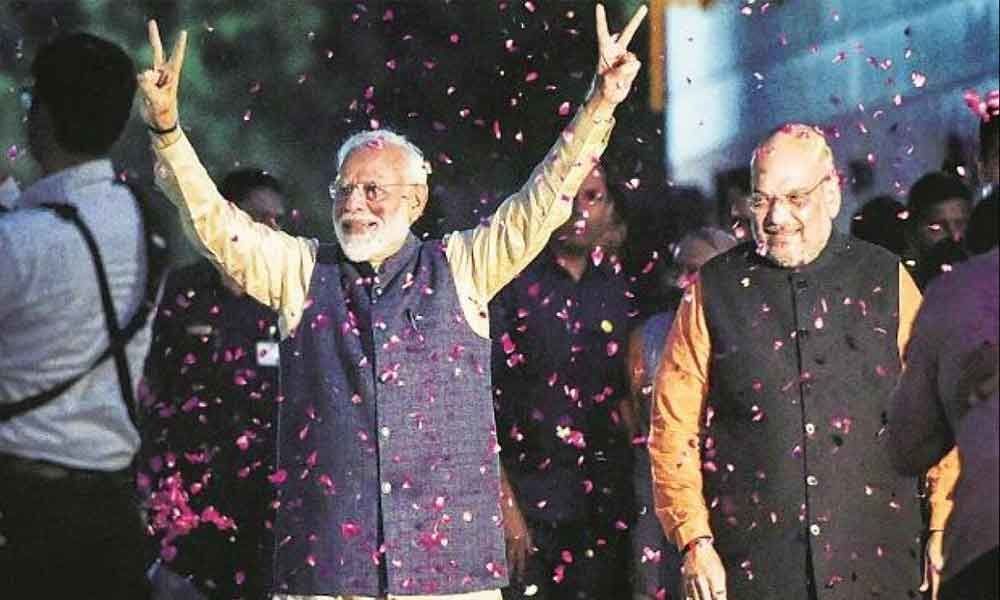Live
- They always want me to win, and now I feel lucky to have been offered a story like ‘Zebra’: Satyadev Kancharana
- ‘Democracy first, humanity first’: PM Modi in Guyana's parliament on two countries' similarities
- PKL Season 11: Telugu Titans register third straight win to top standings
- Is Pollution Contributing to Your COPD?
- NASA Unveils Underwater Robots for Exploring Jupiter's Moons
- Additional Central forces arrive in violence-hit Manipur
- AR Rahman and Saira Banu’s Divorce: Legal Insights into Common Issues in Bollywood Marriages
- 82.7 pc work completed in HPCL Rajasthan Refinery area: official
- Curfew relaxation extended in 5 Manipur districts on Friday
- Tab scam prompts Bengal govt to adopt caution over fund disbursement
Just In

For exporters, the BJP has promised measures to promote trade and increase the share of manufacturing in the economy.
India's economy is set for a major boost if Prime Minister Narendra Modi follows through with key campaign promises following his party's sweeping election victory.
The Bharatiya Janata Party pledged cash handouts to farmers, $1.44 trillion to build roads, railways and other infrastructure, a boost to manufacturing, and a doubling in exports. Those promises, along with tax cuts for middle class Indians, resonated with voters, who gave the BJP a majority of the seats in the parliament, according to official results on Thursday.
The economy is in need of stimulus. Consumer spending has taken a knock as a crisis among shadow banks curbed lending. Investments have slowed and unofficial figures show a pick-up in unemployment. Economists are forecasting economic growth of 6.5% in the three months to March, which would be the slowest pace since mid-2017.
Finding the money to pay for the populist pledges will be Modi's immediate challenge. The government has already widened its budget deficit target for the year through March 2020 to 3.4% of gross domestic product. With revenues under strain, the government is borrowing more and seeking to extract additional capital from the central bank. Any further widening in the fiscal deficit would jeopardize the nation's credit rating.
Decelerating Growth
India's economy is estimated to grow at the slowest pace in five years
Fitch Ratings Ltd. said on Thursday improving the nation's weak government finances will be crucial for the new administration. Fiscal consolidation stalled under the BJP in recent years and its campaign promise to support farm incomes has added to spending pressure, it said.
"Given that there is limited fiscal space it is hard to see them meeting those targets," said Shilan Shah, senior India economist at Capital Economics Ltd. in Singapore. "But even if they are partially fulfilled, it should provide some boost to growth."
The BJP's manifesto targets 100 trillion rupees ($1.44 trillion) of capital investment in infrastructure by 2024. It's a huge commitment considering the government's expenditure on roads and railways was about 1.2 trillion rupees for the year to March 2019.
Modi's economic record in his first term was patchy. He reduced red tape, overhauled centuries-old bankruptcy laws and introduced a nationwide sales tax, which won him praise from investors. But the chaotic roll-out of the new tax system and the shock ban of high-value currency notes in 2016 to combat corruption disrupted business activity, the effects of which are still being felt today.
The initial euphoria in the markets after Modi's win indicates investors expect policy continuity and further economic reforms. He'll need to do that against the backdrop of global trade tensions and volatile prices for oil -- India's biggest import item and a major driver of inflation and trade deficits in the country.
One of the government's key failures in its first term was the lack of job creation, especially for young people. The Hindu nationalist BJP pledged in its election manifesto to foster entrepreneurship through collateral-free loans and easing regulations for start-ups.
Modi may also look at selling stakes in state-owned companies, privatizing ailing units such as Air India Ltd., and merging state-run banks. Referred to locally as disinvestment, these options would help the government raise revenue to finance spending.
For exporters, the BJP has promised measures to promote trade and increase the share of manufacturing in the economy.
To address the broader concerns of long-term investors, the government should consider easing rules around purchasing land and hiring and firing people, the finance ministry's top adviser said this week. That would go some way in reversing the recent decline in foreign directinvestment.
"Manifestos are aspirational but then we have to see some hard numbers being put without endangering the macroeconomic stability," said Rajat Nag, former managing director general at the Asian Development Bank and a distinguished fellow at the New Delhi-based National Council of Applied Economic Research. "Macroeconomic stability will be very important to maintain to attract foreign investment."
Source:Bloomberg

© 2024 Hyderabad Media House Limited/The Hans India. All rights reserved. Powered by hocalwire.com







